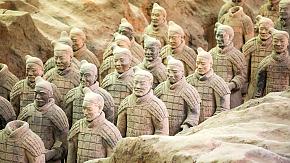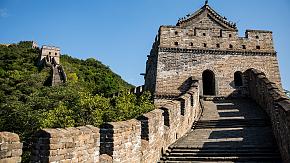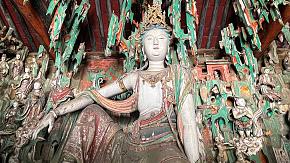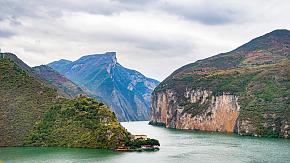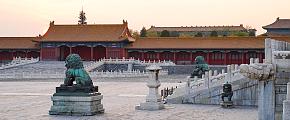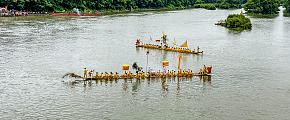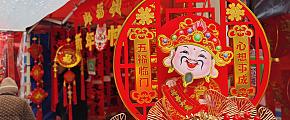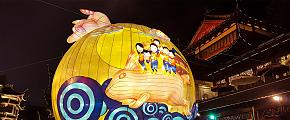Things You Need to Know About the Great Wall
If one were to describe all the achievements of ancient China as a crown, the greatest and brightest jewel is no doubt the Great Wall. Known as one of the world's seven wonders, the Great Wall has stood for thousands of years and witnessed China's remarkable history unfolding. Yet, standing before its majesty, one feels dwarfed by the overwhelming number of stories this structure has seen, even though parts of it now ruin. Nowadays, as one of the must-see attractions in China, the Great Wall has attracted more than 10 million people to visit this magnificent structure each year. If you want to take a trip to China, the Great Wall could be at the top of your bucket list.
Are you ready to be "in the know" about China's Great Wall?
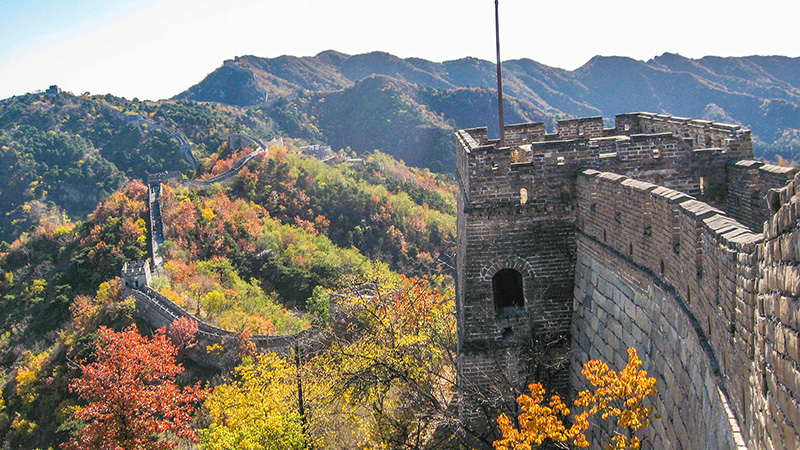 The Great Wall
The Great Wall
What do We Know About the Great Wall?
There are many unknown things about "The Long Wall", the nickname the Chinese gave. For instance, as a defensive structure, the Great Wall was where battles often broke out in ancient times. No matter who won the war, iron-grey armor and corpses red with blood were often left behind. The Great Wall was a site where many tragedies took place, and it reminded people of the consequences of war.
Furthermore, did you know that rice was initially included in the mortar mix between the stones because of its stickiness? And did you know portions of the Wall are still being discovered today? No wonder the Great Wall of China was named one of the New 7 Wonders of the World in 2007!
The Genesis of the Great Wall
The genesis of the Great Wall can be reached in the Warring States period from 475 to 221 BC when Chinese feudal kingdoms built earthen ramparts to defend against nomadic invaders, including Huns.
Today, war may be far away from Chinese people's minds when they stand before this world wonder. The Great Wall is no longer a military defense but a historical site. The ruins are nestled amidst farmland, and flowers have burst into bloom around the structure. Although natural forces have disintegrated parts of the Wall, they've left incredible ruins behind – which now represent, above all else, the power of human tenacity.
What to Visit on the Great Wall?
Perhaps you have visited the Great Wall but have yet to get the most out of the experience. Today, I want to get out of the hustle and bustle to experience the Wall's natural grandeur.
There is a Chinese saying goes, "he who has not climbed the Great Wall is not a true man," which implies that people wouldn't understand what the human spirit is capable of until they overcome the Great Wall; then, for some people who've experienced the Great Wall in another way, perhaps they have taken on the next level.
Here I have listed some iconic Great Walls in Beijing, namely Badaling Great Wall, Mutianyu Great Wall, Jinshanling Great Wall, and Jiankou Great Wall, plus Gubeikou Great Wall, as well as Simatai Great Wall.
First, let's start our trips from the Badaling Great Wall, the most representative and magnificent section of the Ming Great Wall. Honest, if you don't drive a car, and hiring a driver is not an option, it can be a headache to reach the Great Wall from Beijing by bus and taxi. Not with Badaling, which lies closest to Beijing, is well restored, and has easy train access! On the downside, it's very touristy, especially during public holidays. So if you want a nice shot to post on your social media or enjoy the splendid views, try one of the other sections during the Golden Week.
As the most well-preserved section, Mutianyu Great Wall is the longest Great Wall in China. Located 40 miles (65km) north of Beijing city proper, it is also a tremendous precious wall of the Ming dynasty with fewer tourists. It is fascinating natural sightseeing, great architectural structure, and intensive enemy towers, thus a good destination on hot holidays for a Great Wall tour at ease.
Continue our tours at the Mutianyu Great Wall; you will see some ancient watchtowers, which are seldom seen along other sections and quite rare in the architectural history of the Great Wall. Examples are the Zhengguan Terrace (No. 6 Watchtower), comprised of three hollow watchtowers, and Big Corner Tower (No. 1 Watchtower), named so because only one big corner can be seen from the paths on three sides.
If you have only one chance to see the stunning view of the Great Wall, make it to Jinshanling Great Wall – the Golden Mountain Ridge. It is the most picturesque and arguably beautiful section of the Great Wall near Beijing. Here, you can see many watch towers all in a row. I would call it mid-level hiking ability - lots of steep ups and downs and twice at least climbing on all fours. Yet, the views are beautiful and worth the work!
Located around 100km north of Beijing, it is entirely different from its better-known neighbors, like Badaling or Mutianyu. Jiankou Great Wall translated as "Arrow Nock", maybe a nightmare for those mountain hikers; Because this Great Wall was built on ridges with cliffs on each side, making it one of the most dangerous sections. When standing on the steepest Great Wall sections, you'll be amazed by the picturesque architectural feats of the 15th and 16th centuries with majestic walls, So you must record this unforgettable moment.
After experiencing the most exciting moment in Jiankou Great Wall, I will now take you to visit The Great Wall of Gubeikou. What is quite interesting is that this section of the Great Wall was shrouded in a sea of clouds in Miyun District, northeastern Beijing. The Gubeikou Great Wall is one of the most crucial passes of the Great Wall of China, and it has witnessed ceaseless wars and conflicts in history.
Finally, we will end our Great Wall journey at Simatai Section; it remains the original appearance of the Great Wall and is the only section where you can enjoy the night tours. When the night falls, the paths are illuminated with soft light. At the foot of the Great Wall lies the Gubei Water Town, where you can spend the night exploring the majestic surrounding.
The Simatai night experience is available between 18:00 and 22:00 from April to October and 17:30 and 21:00 from November to March.
When is the Best Time to Visit the Great Wall?
You can visit the Great Wall all year round; however, every Spring ( April, May ) and Autumn ( September, October, and November ) are the best seasons for climbing the Great Wall, when the temperature is quite favorable. Although the autumn in Beijing is relatively short, you will enjoy the most fantastic autumnal scenery in Beijing. Meanwhile, during Labour Day ( from 1st May to 3rd May ) and National Holidays ( from 1st October to 7th October), many tourists will swarm into the well-known attractions, so the hotels and landscapes in Beijing will be packed at that time. Autumns are dry with solid winds, and winters can dip to 15 degrees Celsius. Summers are hot but dry, and temperatures average around 30 degree Celsius.
Therefore, you must prepare well for your hike and check out your weather app before you set out.
How to Get to the Great Wall?
Traveling with Odynovo means having a private car and driver with you throughout the journey. You don't have to worry about the transport as we will take care of everything. So, you should relax and enjoy the best the destination offers. If you travel independently, here, I have listed the most convenient transportation ways to arrive at the most-visited Great Walls.
1. To Badaling Great Wall:
Take an S2 train from Beijing Huangtudian Railway Station, the earliest departing at 7:46 a.m. and the last returning at 9:12 p.m. (Ticket fare: CNY 6 one-way).
2. To Mutianyu Great Wall:
Take express bus 916 to Huairou North Street Station first, and the destination is a 20-minute drive from the station.
3. To Jinshanling Great Wall:
There's a direct bus from Dongzhimen Wai or Wangjing West Long-Distance Bus Station. The earliest departs at 7:40 a.m., and the last returns at 4 p.m. Ticket fare: 50 yuan one-way.
4. To Jiankou Great Wall:
Take express bus 916 from Dongzhimen to Huairou North Street Station and then take a taxi to the destination.
5. To Simatai Great Wall:
Take a direct bus from Dongzhimen Wai Bus Station to Gubei Water Town. The earliest departs at 9 a.m.
Travel Tips of the Great Wall
1. Beijing has a typical warm temperate semi-humid continental monsoon climate. The annual average temperature is 11.8°C, with the coldest month of January averaging -4.6°C and the hottest month of July averaging 26.1°C. The average annual temperature of the Great Wall is more than 3 °C lower than in Beijing. Meanwhile, the spring and autumn months are shorter in Beijing, and the winter months are slightly longer, with an average annual precipitation of 644mm and a frost-free period of 180 days.
2. The Great Wall is on a higher terrain and is on the windy side, so you need to pack more clothes.
3. Some sections of the Great Wall are very sloping, so you should wear trainers on the trail.
4. The Northern trail at Badaling has resumed operation so that visitors can take the cable car as an excursion option.
5. Tourists can take the cable car to explore the magnificent scenery at the Badaling, Mutianyu, Jinshanling and Simatai sections.
6. Jinshanling and Simatai Great Wall are suitable for ordinary visitors, hikers and photographers
7. Jiankou and Gubeikou Great Wall are recommended for experienced hikers, adventurers, and photographers.
8. Mutianyu is popular among foreigners and a good choice during holidays. And for people who lack physical strength or families with kids, Mutianyu Great Wall is recommended, for the gentle slope makes it less challenging.
If you're planning to travel to China and explore more cultural wonders with your own eyes, please don't hesitate to contact us, just simply tell us your interests and needs, and one of our travel experts will create a tailor-made itinerary for you within 24hrs.
Quick Question
Related Posts You May Like
What Our Clients Say
Explore the latest verified reviews of Odynovo's travel services on Tripadvisor, Google, Trustpilot, Product Review and more trusted platforms.

